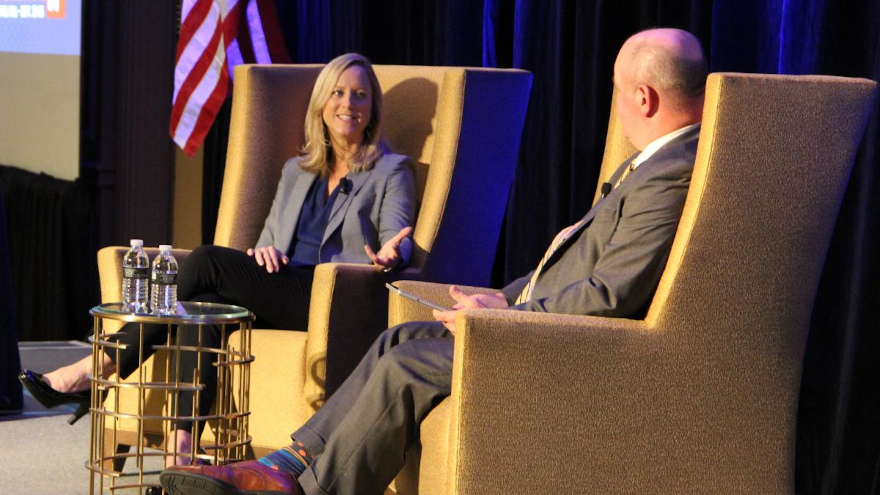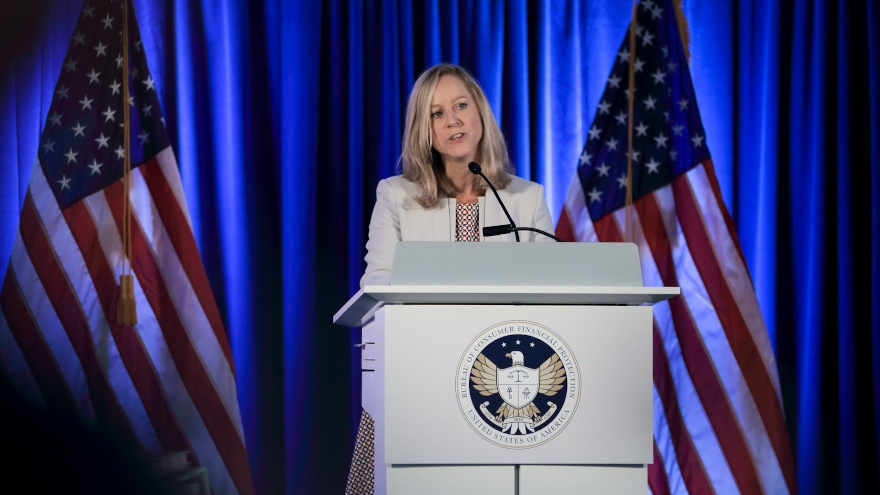Hudson Cook is preparing to offer the industry another way to stay up to date on the Consumer Financial Protection Bureau’s activities.
Hudson Cook partners Eric Johnson and Justin Hosie will be hosts for a new monthly webinar series titled, “CFPB Bites of the Month.” Johnson and Hose are scheduled to orchestrate their first webinar on Jan. 15.
“With consumer financial services concerns front and center in the daily news cycles — including the 2020 presidential election — the Consumer Financial Protection Bureau’s work has taken center stage,” Hudson Cook said.
“Since Trump’s appointee, Kathleen Kraninger, took over as the bureau’s director in December 2018, we’ve seen an increase in the number of CIDs issued and enforcement actions over prior acting director Mick Mulvaney, and continued examinations, as well as an emphasis on consumer financial education,” the firm continued.
To help keep clients abreast of what is happening at the CFPB, the firm noted these monthly updates, including but not limited to: CFPB press, rulemaking, ongoing litigation, supervision and other timely news.
In order to accommodate busy schedules, the webinars will last just 30 minutes during lunchtime on the third Wednesday of each month.
“With all of the press reports about the CFPB flooding our inboxes every day, we felt it would help our clients to take just 30 minutes a month to keep them up-to-date on the CFPB and how its work may affect their businesses,” Hosie said in a news release.
Johnson added, “We write plenty of articles for various industry publications but thought it would benefit busy in-house counsel and other company executives if we condensed everything into a regular report. We want our clients to know what’s going on and how to mitigate their risk.”
Hudson Cook’s attorneys include former senior federal regulators and staff attorneys, including for the CFPB, as well as former in-house counsel for major banks and finance companies. Working with the firm’s government investigations, examinations and enforcement practice group, attorneys closely watch developments among federal and state agencies and legislative bodies to anticipate new laws and regulations as well as changes to existing statutes.
“CFPB Bites of the Month” is the newest webinar series from Hudson Cook, joining the monthly series titled, “Compliance Coffee Breaks” on the second Tuesday of each month.
Information about all of the firm’s webinars can be found at hudsoncook.com/webinars.
Last week, the Financial Accounting Standards Board (FASB) unanimously voted to delay implementation of the Current Expected Credit Loss (CECL) accounting standard, but segments of the industry still remained concerned about the regulatory matter.
To recap, FASB is looking to ensure that financial institutions have solid measures in place to ensure they have appropriate reserves for any future losses based on the life of each auto loan. As a result, the board has instituted its new Current Expected Credit Loss model (CECL).
The new model will require higher levels of loan loss reserves and lead to changes in lending practices and portfolio management. It will also require a significant amount of data capture, analysis and modeling to meet the implementation deadline.
An update from the Financial Accounting Standards Board (FASB) indicated its board voted unanimously last week to delay the effective date of the its new Current Expected Credit Loss model (CECL). For smaller, publicly traded companies, the delay is from 2021 to 2023 and from 2022 to 2023 for private companies and nonprofits.
The update also mentioned that large, publicly traded companies such as nationwide banks still would be expected to implement the standard on Jan. 1.
FASB indicated its delay will be official once its final update is published later this fall.
Officials explained the proposed interagency policy statement describes the CECL methodology for determining allowance for credit losses (ACLs) at amortized costs, including loans held for investment, net investments in leases, held-to-maturity debt securities, and certain off-balance sheet credit exposures. It would become effective at the time of each institution’s adoption of CECL.
The proposed policy statement also indicates that:
— Examiners will review the conceptual soundness of the model used in the loss estimation process, including developmental evidence, performing ongoing monitoring activities, including process verification and benchmarking, and analyzing model output;
— Examiners should recognize that the processes, loss estimation methods, and underlying assumptions an institution uses to calculate ACLs require the exercise of a substantial degree of management judgment; and
— It is inappropriate for examiners to seek adjustments to ACLs for the sole purpose of achieving ACL levels that correspond to a peer group median, a target ratio, or a benchmark amount when management has used an appropriate expected credit loss framework to estimate expected credit losses.
Not having a uniform date when all financial services organizations have to comply again triggered concerns.
“With today’s vote to delay CECL implementation for smaller companies, FASB acknowledges the significant challenges of complying with one of the most sweeping accounting changes in year,” said American Bankers Association president and chief executive officer Rob Nichols, though he expressed disappointment that the board failed to extend the implementation delay to all filers as ABA previously sought.
“Major market participants including investors, consumer groups, auditors and financial institutions, as well as members of Congress from both parties, have all called for such a delay given concerns that CECL could harm the broader economy and vulnerable populations in particular,” Nichols added in a news release. “While we view this as a missed opportunity, FASB still has time to do the right thing and put CECL on pause for all companies until it can determine its impact.”
Advocates for credit unions shared some disappointment in the latest development, too. The Credit Union National Association (CUNA) said it supports the delay, but continues to have concerns about CECL, which would use an “expected loss” measurement for the recognition of credit losses.
“CUNA’s longstanding position has been and continues to be that application of CECL to credit unions is inappropriate, and that implementation of the new standard will create compliance challenges, as well as alter the financial standing of credit unions,” CUNA Deputy chief advocacy officer Elizabeth Eurgubian said.
CUNA shared its specific concerns in a September comment letter on the proposed delay, noting that CECL could hinder credit unions and other lenders’ service to low- and moderate-income borrowers.
Earlier this summer, FASB looked to reinforce its position concerning the upcoming mandates placed on banks, credit unions and finance companies in connection with reserving for losses, emphasizing the changes could be implemented without incurring “significant costs.”
In June, FASB issued a proposed Accounting Standards Update (ASU) that included amendments designed to address issues raised by stakeholders, which triggered proposals by federal lawmakers who also were looking to delay these significant accounting changes.
Despite some remaining concerns, the American Financial Services Association (AFSA) still applauded last week’s developments.
“Virtually all stakeholders, from consumer advocates to financial institutions, have called on FASB to delay implementation,” AFSA said on its website. “AFSA is pleased to see that the Board has delayed the implementation but continues to call for a rigorous impact study before moving forward with the standard. AFSA continues to back legislation in Congress to delay implementation until this study is completed.”
Dealers and finance companies are getting regulatory assistance in four more states in an effort to help buyers and contract holders protect their purchases via products available in F&I offices.
A trio of industry groups recently praised state legislatures across the nation for continued progress in passing new protections for consumers who purchase service contracts or GAP waivers for their vehicles. The Service Contract Industry Council (SCIC), Motor Vehicle Protection Products Association (MVPPA), and Guaranteed Asset Protection Alliance (GAPA) successfully promoted new regulations and guidelines to help owners protect their vehicles.
Among the new state consumer protection laws:
— Mississippi: HB 925, which took effect July 1, expands the definition of a service contract to include contracts to repair or replace tires, wheels and windshields for damage from road hazards, and covering contracts for paintless dent repair and contracts to replace lost or stolen key fobs.
— Arkansas established a free-look period requirement on GAP waivers, allowing purchasers ample time to understand the benefits of their GAP waivers before fully committing. Arkansas HB 1672, which took effect July 24, will allow anyone to cancel a GAP waiver without a penalty, fee or cost within 30 days of purchase.
— New Mexico: SB 350 requires that automatic renewal provisions be clearly and conspicuously disclosed within a service contract or a sales presentation if sold orally.
— Florida – HB 925 requires that home warranties that cover HVAC systems clearly indicate that consumers can also purchase coverage for certain system components.
“Service contracts and GAP waivers exist to help consumers,” SCIC executive director Tim Meenan said in a news release. “These industry groups are proud to have spurred important changes that better protect consumers.”
A GAP waiver is an agreement between a borrower and their creditors designed to cancel some or all of the remaining balance after a total loss. A GAP waiver is not insurance or a warranty but can provide certain financial security for the owner of a vehicle.
The industry groups pointed out this year’s legislation follows a half-dozen new laws passed last year around the nation, enhancing consumer protections in this area.
The organizations mentioned legislation enacted in Idaho, Minnesota, Utah, Mississippi, West Virginia and Wisconsin last year added protections to be covered by service contracts and ensuring that consumers are fully informed about their service contracts.
KPA collected another industry accolade this week.
The provider of environmental health and safety (EHS), HR management and F&I compliance software and services, has been honored as a 2019 Top 20 Health and Safety Training Company, by Training Industry, a research and information resource for corporate learning leaders.
This Top 20 award comes on the heels of KPA being named a 2019 Online Learning Library Top 20 Company in July.
“The 2019 Top 20 Health and Safety Training Companies List represents the leading providers in health and safety and regulatory and compliance training,” said Ken Taylor, president of Training Industry.
“These companies offer fresh and up-to-date content, continuously adding new courses and resources to ensure employees receive the training they need,” Taylor continued in a news release.
The 2019 Training Industry Top 20 Health and Safety Companies list was based on the following criteria:
• Breadth and diversity of health and safety training offerings
• Ability to deliver training in preferred modalities
• Company size and growth potential
• Geographic and vertical reach
• Quality of clients
“Being recognized as a Top 20 company both for Health and Safety Training and for Online Learning Library underscores KPA’s commitment to offering exceptional training to our clients,” said, KPA president and chief executive officer Chris Fanning.
“Highly relevant, engaging training that can be conveniently completed online is critical to successful compliance and safety programs,” Fanning went on to say.
KPA’s training programs can help employers meet federal, state, and local requirements with interactive courses that capture learners’ attention and test their understanding of required concepts. In addition to award-winning training, KPA offers a comprehensive suite of workplace and workforce management software and services that can allow clients to automate manual compliance processes, improve their safety culture, and reduce their total cost of risk.
More than 10,000 clients including dealerships, insurance brokers, warehouse and distribution, food and beverage and manufacturing use KPA for their risk management solutions.
For more information on the award and other compliance and safety programs, visit www.kpaonline.com or call (866) 356-1735.
Finance companies that use Recovery Database Network (RDN) now have some additional assurance their repossessions are being completed according to state and federal regulations.
On Wednesday, the KAR Global business unit rolled out a seamless application interaction with the American Recovery Association (ARA) that is designed to provide RDN customers instant access to recovery agents’ compliance status.
Both RDN and ARA insisted this additional visibility into real-time information offers increased confidence when considering an agent for assignment.
“By working with the ARA, the industry’s leading voice for establishing universally accepted compliance standards, RDN customers gain peace of mind.” said Justin Zane, president of RDN and Clearplan.
“The new ARA Compliance System will provide all industry stakeholders a comprehensive, verified one-stop solution for compliance management that operates in real-time,” Zane continued in a news release. “This is a big step forward for our industry, and we believe it will deliver great value to all current and future customers.”
Any finance company or agent who assigns or accepts assignments through RDN can take advantage of the transparency offered by the new compliance status feature. To access the benefits of this new compliance tool, finance companies and agents can simply enroll in the ARA Compliance program.
When logging a new case in RDN, color codes under an additional “ARA” column indicate whether an agent is ARA Standards Compliant: red for non-compliant or incomplete, green for compliant, and yellow for pending status. Lenders can quickly filter agents based on current compliance status.
An “ARA Compliant Agent(s)” filter option is also available for agency management.
“ARA is uniquely positioned to lead and manage the oversight of these compliance initiatives for the benefit and mutual success of all stakeholders in the recovery space,” ARA president Dave Kennedy said.
“Together with RDN, we will strive to protect and serve the interests of lenders, forwarders and the repossession community while increasing the efficiency and effectiveness for how compliance is engaged and verified,” Kennedy went on to say.
For more than 10 years, RDN’s software-as-a-service technology has been designed to deliver improved recovery performance and increased operational efficiency while providing full security and transparency.
Similarly, Clearplan’s digital platform can provide recovery agents, drivers, forwarders and automotive lenders a centralized, mobile, cloud-based hub for repossession workflow and logistics management.
Together, Clearplan and RDN, both business units of KAR Global, can connect thousands of recovery agents and automotive finance companies to a streamlined vehicle recovery process — with reduced redundancies and increased actionable data. For more information, visit this website.
Members of ARA, the world’s largest association of recovery and remarketing professionals, specialize in locating and repossessing collateral on behalf of lending institutions such as banks, savings institutions, finance companies, credit unions, rental/leasing companies, and auto, truck and equipment dealers. The nonprofit organization’s members serve 27,000 national and international cities. All members are certified independent business operators. For more information, www.repo.org.
Along with naming academics, industry leaders and consumer advocates to a trio of committees, the Consumer Financial Protection Bureau also announced last week that it will establish a taskforce to examine ways to harmonize and modernize federal consumer financial laws.
The bureau explained the Taskforce on Federal Consumer Financial Law will examine the existing legal and regulatory environment facing consumers and financial services providers and report to CFPB director Kathleen Kraninger its recommendations for ways to improve and strengthen consumer financial laws and regulations.
The CFPB continued that the taskforce will produce new research and legal analysis of consumer financial laws in the United States, focusing specifically on:
— Harmonizing, modernizing and updating the enumerated consumer credit laws and their implementing regulations
— Identifying gaps in knowledge that should be addressed through research
— Ways to improve consumer understanding of markets and products
— Potential conflicts or inconsistencies in existing regulations and guidance
“An objective and independent evaluation of our current regulatory framework to identify where there may be gaps or where regulation should be simplified or modernized is needed to help us more effectively carry out our mission of protecting consumers,” Kraninger said in a news release.
“As we work to set up the taskforce, we encourage interested individuals to apply to be considered to be part of the taskforce,” she continued.
The bureau added that this taskforce is in part inspired by an earlier commission established by the Consumer Credit Protection Act in 1968. In addition to various changes to consumer law generally, that act established a national commission to conduct original research and provide Congress with recommendations relating to the regulation of consumer credit.
The commission’s report contains original empirical data, information, and analyses — all of which undergird the report’s final recommendations. The data, findings, and recommendations from the commission were all made public and the report led to significant legislative and regulatory developments in consumer finance.
The bureau went on to mention that will be seeking to fill the taskforce with several members with a broad range of expertise in the areas of:
— Consumer protection and consumer financial products or services
— Significant expertise in analyzing consumer financial markets, laws, and regulations
— Demonstrated record of senior public or academic service
The bureau is accepting applications for members to serve on the taskforce. Go to this website for additional information on the qualifications for members, as well as the process for applying.
CFPB announces advisory committee members
In other news from the regulator, Kraninger also announced the appointment of members to the Consumer Advisory Board (CAB), Community Bank Advisory Council (CBAC), Credit Union Advisory Council (CUAC) and Academic Research Council (ARC). These experts advise bureau leadership on a broad range of consumer financial issues and emerging market trends.
“The bureau is able to protect consumers in the financial marketplace better when it receives input from a wide range of experts and stakeholders,” Kraninger said in a news release.
“With the enhancements we made earlier this year to the structure of the advisory committee program, I am confident that these groups will be able to hit the ground running in their efforts to provide meaningful feedback on Bureau policy and regulations. I look forward to working with them,” she went on to say.
This past spring, Kraninger announced a series of enhancements to the bureau’s advisory committee charters, including:
— Expanding the focus of the meetings to cover broad policy matters
— Increasing the frequency of in-person meetings from two times a year to three times a year for the CAB, CBAC and CUAC
— Elevating the ARC to a director-level advisory committee and increasing its meeting frequency
— Increasing term lengths from one year to two years, among other enhancements
The CAB is mandated by the Dodd-Frank Wall Street Reform and Consumer Protection Act to advise and consult with the bureau’s Director on a variety of consumer financial issues.
The bureau also created three additional discretionary councils: the CBAC, CUAC, and ARC. The CBAC and CUAC advise and consult with the bureau on consumer financial issues related to community banks and credit unions. The ARC advises the bureau on its strategic research planning process and research agenda and provides feedback on research methodologies, data collection strategies and methods of analysis, including methodologies and strategies for quantifying the costs and benefits of regulatory actions.
The following members will serve on each of their respective committees:
Consumer Advisory Board (CAB)
Chair of the CAB – Brent Neiser, Senior Director, National Endowment for Financial Education (Denver)
Nikitra Bailey, EVP, Center for Responsible Lending (Durham, N.C.)
Nadine Cohen, Managing Attorney, Greater Boston Legal Services (Boston)
Sameh Elamawy, CEO, Scratch Services, Inc. (San Francisco)
Manning Field, COO, Acorns (Irvine, Calif.)
Clint Gwin, President & CEO, Pathway Lending (Nashville, Tenn.)
Ronald Johnson, Former President, Clark Atlanta University (Atlanta)
Tim Lampkin, CEO, Higher Purpose Co. (Clarksdale, Miss.)
Eric Kaplan, Director – Housing Finance Program, Milken Institute (Washington, D.C.)
Sophie Raseman, Director of Product, Brightside (San Francisco)
Rebecca Steele, President/CEO, National Foundation for Credit Counseling (Washington, D.C.)
Tim Welsh, Vice Chairman Consumer and Business Banking, U.S. Bank (Minneapolis)
Community Bank Advisory Council (CBAC)
Chair of the CBAC – Aubrey Hulings, VP, Operations Manager, The Farmers National Bank of Emlenton (Emlenton, Pa.)
J. Erik Beguin, Founder, CEO and President, Austin Capital Bank (Austin, Texas)
Maureen Busch, VP Compliance and CRA Officer, The Bank of Tampa (Tampa, Fla.)
Patrick Ervin, EVP, Independent Bank (Troy, Mich.)
Shan Hayes, President and CEO, Heartland Tri-State Bank (Elkhart, Kan.)
Bruce Ocko, Senior VP Director of Mortgage & Consumer Lending, Bangor Savings Bank (Bangor, Maine)
Valerie Quiett, SVP and Chief Legal Officer, Mechanics and Farmers (M&F) Bank (Durham, N.C.)
Heidi Sexton, EVP/Chief Compliance and Risk Officer, Sound Community Bank (Seattle)
Credit Union Advisory Council (CUAC)
Chair of the CUAC – Sean Cahill, President & CEO, TrueSky Credit Union (Oklahoma City)
Arlene Babwah, VP Risk Management, Coastal Federal Credit Union (Raleigh, N.C.)
Teresa Campbell, President & CEO, San Diego County Credit Union (San Diego)
Rick Durante, VP, Director of Corporate Social Responsibility and Government Affairs, Franklin Mint Federal Credit Union (Chadds Ford, Pa.)
Doe Gregersen, Vice President & General Counsel, Landmark Credit Union (New Berlin, Wisc.)
Brian Holst, General Counsel, Elevations Credit Union (Boulder, Colo.)
Racardo McLaughlin, VP Mortgage Originations/Operations (TwinStar Credit Union, Lacey, Wash.)
Rick Schmidt, President & CEO, WestStar Credit Union (Las Vegas)
Academic Research Council (ARC)
Michael Baye, Bert Elwert Professor of Business Economics, Indiana University (Bloomington, Ind.)
Karen Dynan, Professor of the Practice of Economics, Harvard University (Cambridge, Mass.)
Terri Friedline, Associate Professor, University of Michigan (Ann Arbor, Mich.)
John Lynch, Jr., Director of the Center for Research on Consumer Financial Decision Making and Senior Associate Dean for Faculty and Research, University of Colorado Boulder (Boulder, Colo.)
Brigitte Madrian, Dean/Marriott distinguished professor, Brigham Young University (Provo, Utah)
Tom Miller, Professor of Finance and Jack R. Lee Chair, Mississippi State University (Starkville, Miss.)
Joshua Wright, Professor, Scalia Law School at George Mason University (Arlington, Va.)
The leader of the Consumer Financial Protection Bureau discussed a variety of compliance topics with the National Independent Automobile Dealers Association.
Organizers called it an “unprecedented appearance” by CFPB director Kathy Kraninger that highlighted Tuesday’s regulatory briefings at NIADA’s National Policy Conference.
According to a news release, Kraninger was joined on Tuesday’s agenda by deputy assistant to the president and deputy director of the National Economic Council Andrew Olmem and keynote speaker Lt. Col. Oliver North.
During her fireside chat with NIADA senior vice president Shaun Petersen, Kraninger touched a wide array of topics, including changes to the CFPB’s consumer complaint database and an upcoming rule for third-party debt collectors.
She said while the CFPB will keep its controversial consumer complaint database available to the public, there will be changes to address the concerns of the business community, including a new landing page that includes information providing perspective to the complaints in the database.
“We’ve done a lot of outreach and had other conversations about how we can make this better,” Kraninger said. “I believe fundamentally that things that are made public — I can’t pull that back. I don’t think that’s consistent with transparency or the way the government should operate. But putting that information in context is helpful.”
In his session, Olmem provided insight and answered questions about the Trump administration’s approach to economic policy, touching on topics such as jobs, over-regulation and tariffs.
North — a combat-decorated Marine who served as counter-terrorism coordinator for the National Security Council, as well as a best-selling author, founder of a small business, holder of three U.S. patents and author of a syndicated column — gave the audience of small business entrepreneurs lessons on leadership, illustrated with stories from his career as a Marine and as host of Fox News Channel’s “War Stories.”
Tuesday’s regulatory sessions also included an update from the Federal Trade Commission’s Nikhil Singhvi, while Kil-Jae Hong of the National Highway Traffic Safety Administration and Tom Musick of the National Safety Council discussed new ways of addressing vehicle recalls. In addition, Andrew Aragon of Quorum offered ideas about how dealers can increase their political engagement in today’s digital world.
The National Independent Automobile Dealers Association’s annual trip to Washington D.C., opened with record attendance on Monday. The event continued on Wednesday with the Day on Capitol Hill when more than 200 independent dealers and industry partners meet with members of Congress to advocate for the used-vehicle industry and small business.
Hudson Cook welcomed its newest partner this week.
The firm announced that attorney Mark Rooney has joined Hudson Cook as a partner in its Washington, D.C. office. His practice focuses on the defense of consumer litigation under the Fair Debt Collection Practices Act (FDCPA), Telephone Consumer Protection Act (TCPA), Fair Credit Reporting Act (FCRA) and other state and federal consumer protection laws.
He founded The Rooney Firm and has represented clients in litigation and defended clients against government enforcement actions and investigations for more than 10 years at two prominent consumer financial services practices in Washington, D.C.
“Mark has a wealth of experience in the defense of both civil litigation matters as well as government enforcement actions against some of the most prominent companies in the financial services space,” said Lucy Morris, chair of Hudson Cook’s government investigations, examinations and enforcement practice. “His work as co-chair of the American Bar Association’s subcommittees on FDCPA and TCPA litigation exemplifies his leadership and depth of knowledge in consumer protection regulation.”
Rooney joins the Hudson Cook government investigations, examinations and enforcement practice in providing litigation support to consumer financial services companies and others facing government scrutiny or private consumer litigation. The firm’s attorneys in this practice area have decades of experience as private practitioners, in-house counsel, and counsel for federal agencies, including the Consumer Financial Protection Bureau, Federal Trade Commission and Office of the Comptroller of the Currency.
Rooney can be reached in Hudson Cook’s Washington, D.C. office at (202) 715-2015 or by email at [email protected].
It’s no longer just a hunch emanating from dealerships and finance companies that the Consumer Financial Protection Bureau and state attorneys general are working together. The CFPB made an official announcement to the fact on Tuesday.
The bureau, working in partnership with multiple state regulators, launched the American Consumer Financial Innovation Network (ACFIN). It’s an organization that officials explained is designed to enhance coordination among federal and state regulators to facilitate financial innovation.
The CFPB said it invited all state regulators to join ACFIN, and the initial members of ACFIN are the attorneys general of:
— Alabama
— Arizona
— Georgia
— Indiana
— South Carolina
— Tennessee
— Utah
The CFPB insisted ACFIN will enhance shared objectives such as competition, consumer access and financial inclusion. Additionally, the regulator said the ACFIN will promote regulatory certainty for innovators, benefiting the U.S. economy and consumers alike.
Officials went on to say the network also will seek to keep pace with market innovations and help ensure they are free from fraud, discrimination and deceptive practices.
As a result of this partnership, the CFPB added ACFIN members will share information to facilitate coordination among the members and coordinate on innovation-related policies and programs.
“Federal and state coordination promotes consistency in the regulation of consumer financial products and services while facilitating consumer-beneficial innovation,” CFPB director Kathleen Kraninger said. “ACFIN will provide a platform for federal and state regulators to coordinate with each other as they develop new rules of the road and apply existing ones. This coordination can provide greater regulatory certainty across jurisdictions and allow regulators to keep pace with market developments.
“I will continue to work to encourage other state regulators to join this important new initiative that will foster collaboration among federal and state regulators,” Kraninger continued.
CFPB policies to facilitate compliance and promote innovation
The launch of the American Consumer Financial Innovation Network wasn’t the only development surfacing out of the CFPB on Tuesday.
The bureau also issued three new policies to promote innovation and facilitate compliance:
— The No-Action Letter (NAL) Policy
— Trial Disclosure Program (TDP) Policy
— Compliance Assistance Sandbox (CAS) Policy.
The CFPB recapped that it proposed the policies in 2018 and received public comments on each from a diverse array of stakeholders.
The bureau acknowledged that regulatory uncertainty can hinder the development of innovative products and services that benefit consumers. Officials explained that NALs can provide increased regulatory certainty through a statement that the bureau will not bring a supervisory or enforcement action against a company for providing a product or service under certain facts and circumstances.
The CFPB said the new NAL Policy is meant to improve on the bureau’s 2016 NAL Policy by having, among other things, a more streamlined review process focusing on the consumer benefits and risks of the product or service in question.
On Tuesday, the bureau also issued its first NAL under the new NAL Policy in response to a request by the Department of Housing and Urban Development (HUD) on behalf of more than 1,600 housing counseling agencies (HCAs) that participate in HUD’s housing counseling program.
In 2018, officials noted that HUD brought concerns to the bureau about HCAs and lenders not entering into agreements that would fund counseling services due to uncertainty about the application of the Real Estate Settlement Procedures Act (RESPA). Expressing similar concerns, the Coalition of HUD Intermediaries filed a comment letter in February noting the insufficiency of the Bureau’s old NAL Policy and supporting the new NAL proposed policy.
Officials indicated the no-action letter essentially states that the bureau will not take supervisory or enforcement action under RESPA against HUD-certified HCAs that have entered into certain fee-for-service arrangements with lenders for pre-purchase housing counseling services.
“The NAL, which is an exercise of the bureau’s supervisory and enforcement discretion, is intended to facilitate HCAs entering into such agreements with lenders and will enhance the ability of housing counseling agencies to obtain funding from additional sources,” officials said.
The bureau went on to mention that under the new TDP Policy, entities seeking to improve consumer disclosures may conduct in-market testing of alternative disclosures for a limited time upon permission by the Bureau. The Dodd-Frank Act gives the bureau the authority to provide certain legal protections for entities to conduct trial disclosure programs, as outlined in the TDP Policy.
The new policy streamlines the application and review process, according to the bureau.
The CFPB also pointed out the CAS Policy can enable testing of a financial product or service where there is regulatory uncertainty.
After the bureau evaluates the product or service for compliance with relevant law, officials explained an approved applicant that complies in “good faith” with the terms of the approval will have a “safe harbor” from liability for specified conduct during the testing period.
Approvals under the CAS Policy will provide protection from liability under the Truth in Lending Act, the Electronic Fund Transfer Act or the Equal Credit Opportunity Act.
Kraninger emphasized why the CFPB took these actions.
“Innovation drives competition, which can lower prices and offer consumers more and better products and services. New products and services can expand financial options, especially to unbanked and underbanked households, giving more consumers access to the benefits of the financial system,” she said.
“The three policies we are announcing today are common-sense policies that will foster innovation that ultimately benefits consumers,” Kraninger went on to say.
The Federal Trade Commission closed its settlement case with a dealer software provider involved in a data breach but not before accepting a public comment from the National Automobile Dealers Association, which took a broad view of the developments.
Late last week, the FTC approved a final order settling charges against DealerBuilt, an Iowa-based dealer software provider that allegedly failed to take reasonable steps to secure consumers’ data, leading to a breach that exposed the personal information of millions of consumers.
In its complaint, the FTC alleged that LightYear Dealer Technologies, which does business as DealerBuilt, failed to implement readily available and low-cost measures to protect the personal information it obtained from its dealer clients. The FTC alleged these failures led to a breach of DealerBuilt’s backup database beginning in late October 2016, when a hacker gained access to the unencrypted personal information — such as Social Security numbers and other sensitive data — of about 12.5 million consumers stored by 130 DealerBuilt customers.
As part of the settlement with the FTC, DealerBuilt is prohibited from sharing, collecting, or maintaining personal information unless it implements and maintains a comprehensive information security program designed to protect the personal information it collects.
Among other things, the order requires DealerBuilt to implement specific safeguards that address the allegations in the FTC complaint.
The proposed settlement also requires the company to obtain third-party assessments of its information security program every two years.
Under the order, the assessor must specify the evidence that supports its conclusions and conduct independent sampling, employee interviews, and document review. In addition, the order requires a senior corporate manager responsible for overseeing DealerBuilt’s information security program to certify compliance with the order every year.
Finally, the order grants the FTC the authority to approve the assessor for each two-year assessment period.
So why did NADA get involved? In his letter to the FTC, NADA vice president of regulatory affairs Paul Metrey emphasized his comments did not stem from the merits of the proposed consent agreement between the FTC and DealerBuilt. Rather, Metry said his letter was “to urge the commission to refrain from using this or other individual enforcement actions to determine whether, and to what extent, it should amend its Standards for Safeguarding Customer Information (Safeguards Rule) which the commission is currently reviewing in a separate notice of proposed rulemaking (NPR).”
Metry continued by sharing his recommendation on how the FTC could carry out that review.
“The process for developing regulatory standards that affect entire industries should be developed in a transparent, informed, and data-driven manner by seeking public input from stakeholders on a variety of issues, including the costs, burdens, and benefits related to the standards — or amended standards — under consideration,” he said. “Developing or backing into regulatory standards by relying on enforcement actions that are based on discrete fact patterns and case-specific legal or policy arguments could exclude from the commission’s review key considerations to an issue.
“As the commission considers potential modifications to the Safeguards Rule, we urge it to base its final action on the record that is developed in response to the NPR and not on consent orders that it has entered into with respondents for alleged violations of the Safeguards Rule,” Metry went on to say.
After receiving that one comment, the FTC voted 5-0 to approve the administrative complaint and to accept the consent agreement with DealerBuilt as well as a response to NADA.












